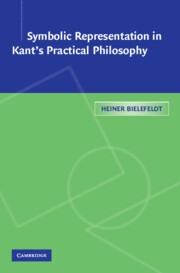Book contents
- Frontmatter
- Contents
- Citations and Translations
- Acknowledgments
- I INTRODUCTION
- II KANT'S SOCRATIC ENLIGHTENMENT
- III THE LAW OF FREEDOM
- IV HOW TO FIND ORIENTATION IN MORAL PRACTICE
- V THE ORDER OF RIGHTS AS A SYMBOL OF HUMAN DIGNITY
- VI TRACES OF PURPOSIVENESS IN NATURE AND HISTORY
- VII SYMBOLISM IN THE PHILOSOPHY OF RELIGION
- VIII CONCLUSION
- Bibliography
- Index
VII - SYMBOLISM IN THE PHILOSOPHY OF RELIGION
Published online by Cambridge University Press: 12 July 2009
- Frontmatter
- Contents
- Citations and Translations
- Acknowledgments
- I INTRODUCTION
- II KANT'S SOCRATIC ENLIGHTENMENT
- III THE LAW OF FREEDOM
- IV HOW TO FIND ORIENTATION IN MORAL PRACTICE
- V THE ORDER OF RIGHTS AS A SYMBOL OF HUMAN DIGNITY
- VI TRACES OF PURPOSIVENESS IN NATURE AND HISTORY
- VII SYMBOLISM IN THE PHILOSOPHY OF RELIGION
- VIII CONCLUSION
- Bibliography
- Index
Summary
Beyond Metaphysical Dogmatism
When confronted with questions of religion and theology, we often step beyond the boundaries of the human condition by making dogmatic propositions to which finite human beings have no title. Even if such a dogmatic attitude goes together with a gesture of humility, as sometimes happens, it is in fact an expression of vanity and presumption. As Kant points out: “A judgment in which we forget to estimate the extent of our powers (of understanding) may at times sound very humble, and yet it makes vast claims and is very presumptuous.” The consequences of such presumptuous claims can be grave. Not only does the human being spoil the sciences by mixing them with elements of theology, he also perhaps obscures the unconditionality of his own moral vocation by rendering moral action dependent on a purported metaphysical cognition of God, divine commandments, or the ways of providence. Moreover, the authoritarian way of breaking off critical reflection, as it is typical of dogmatic metaphysical theology, also nourishes skepticism or even atheism. It is an irony that in the long run, every dogmatic metaphysical doctrine about religious matters, almost by an inner necessity, actually fosters its counterpart – that is, skepticism.
Hence there are many good reasons to seek for a careful way of addressing religious and theological questions. In his critical writings, Kant therefore avoids any premature use of theological concepts.
- Type
- Chapter
- Information
- Symbolic Representation in Kant's Practical Philosophy , pp. 151 - 178Publisher: Cambridge University PressPrint publication year: 2003



